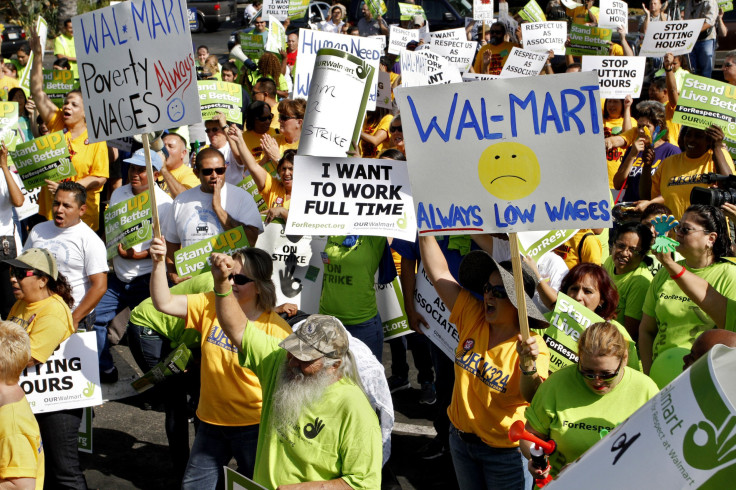Complaints Against Wal-Mart Store's (WMT) Treatment Of Striking Workers Key To Unions' Struggle For Labor Rights

Wal-Mart Stores Inc. (NYSE: WMT), the world's largest retailer, is facing a challenge by the U.S. National Labor Relations Board (NLRB) for its treatment of striking workers, and the case will likely become a symbol of labor unions’ uphill struggle against management to rally non-union workplaces in the U.S.
If Wal-Mart loses the case to the federal agency and higher courts take the case, American employers that don’t recognize unions may have to change their policies -- a bigger impact to businesses than any costs Wal-Mart may have to pay.
The NLRB, which advises workers on how to organize and tries to prevent and remedy unfair labor practices, filed a consolidated complaint on Wednesday that accuses Wal-Mart of breaking labor law in 14 states. The board claims that Wal-Mart vice president David Tovar and 63 managers violated labor law by firing or disciplining workers striking over wages last year. The case represents 19 fired workers and is precedent-setting for a workers’ rights group.
Congress voted the National Labor Relations Act into law in 1935 to protect the rights of employees and employers. The act encourages collective bargaining and restricts certain private sector labor and management practices that harm the welfare of workers.
The NLRB cites Section 8(a)(1) of the act, which states that “It shall be an unfair labor practice for an employer to interfere with, restrain, or coerce employees in the exercise of the rights guaranteed in section 7.” Section seven lists rights to self-organization and collective bargaining and the right to form, assist, join or not join labor organizations.
A Wal-Mart spokeswoman, Brooke Buchanan, denied that the retailer’s managers and Tovar violated labor law. She said in a statement Thursday that the 19 associates behind the complaint were not fired for their participation or membership in a labor group, but for violating company policies such as attendance.
"In this procedural step taken by the NLRB, Wal-Mart looks forward to the opportunity to shed some light on the facts of the case," Buchanan said in the statement. “We believe we acted respectfully and most importantly lawfully.”
NLRB’s Office of Public Affairs did not immediately respond for comment.
Wal-Mart has until Jan. 28 to respond the complaint. After the response, Wal-Mart and the NLRB would have a trail-like proceeding before an agency judge, whose decision would be reviewed by board members of the NLRB, who are presidentially appointed, and other top officials of the agency.
If the officials want to issue an order against Wal-Mart, an appellate court would have to enforce it. NLRB cannot fine Wal-Mart, but could require the company to give the fired workers back-pay and rehire them and request that the company post notices about workers’ rights. Wal-Mart and the NLRB could also reach a settlement at any stage in the proceedings.
© Copyright IBTimes 2024. All rights reserved.





















